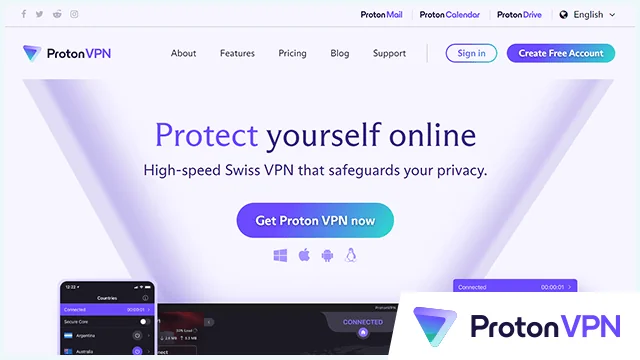10 Best VPNs for Linux in 2023: Secure Remote Collaboration with GUIs and Privacy Features for all Distros

In today’s world, online privacy is becoming increasingly important. With cyber attacks and surveillance on the rise, it’s essential to protect your personal and sensitive data. One of the most effective ways to do this is by using a VPN. Linux users, in particular, have unique requirements when it comes to VPNs. They need VPNs that are easy to use, fully-featured, and compatible with different distros. In this article, we will examine the top 10 VPNs for Linux in 2023, which offer GUIs and advanced privacy features for all distros.
When it comes to VPNs for Linux, one name that constantly pops up is stunnel. It’s a widely used VPN protocol that offers a high level of security and encryption. Many VPN providers have stunnel included in their package, making it easy for users to set up and configure. Another popular choice among Linux distro users is OpenVPN. It’s an open-source VPN protocol that offers unlimited flexibility and customization options. OpenVPN is compatible with all major distros, including Ubuntu, Fedora, and Mint.
If you’re someone who prefers to click and play, then having a VPN with a graphical user interface (GUI) is a must. Fortunately, there are several VPNs that offer easy-to-use GUIs for Linux distros. One such VPN is VPNArea. It provides a user-friendly interface that allows you to connect to servers with just a few clicks. Another great option is IPVanish. It has a sleek and intuitive GUI that makes it easy for users to navigate and control their VPN settings.
When it comes to privacy, VPNs need to have robust features that keep your data secure and anonymous. One VPN that excels in this area is NordVPN. It offers a wide range of privacy features, including double VPN encryption, DNS leak protection, and a strict no-logs policy. Another VPN worth mentioning is Private Internet Access (PIA). It has been reviewed as one of the best VPNs for Linux, with advanced privacy features and excellent performance.
In conclusion, finding the right VPN for Linux can be a daunting task, but it’s essential for protecting your online privacy. The 10 VPNs mentioned above, including stunnel, OpenVPN, VPNArea, IPVanish, NordVPN, and PIA, offer a range of features, robust security, and user-friendly interfaces for all Linux distros. Whether you’re a casual user or a tech-savvy expert, there are VPNs available that meet your specific requirements. So, take control of your online privacy and stay safe on the internet, no matter which distro you use.
Best VPNs for Linux in 2023

Linux users can benefit from using a VPN for various reasons. One of the high advantages is the ability to access restricted websites or content that may be blocked in certain regions. By using a VPN, you can avoid unauthorized access to your information and rest assured that your online activities are secure.
There are several VPN providers that offer GUIs (Graphical User Interfaces) for Linux distros, making it easier for users to set up and control their VPN connections. These GUIs show a sleek and user-friendly interface that allows users to simply connect to the VPN with just a few clicks.
1. CyberGhost
CyberGhost is a popular VPN provider that offers a GUI for Linux users. It is packed with features and provides fast and reliable connections. CyberGhost also offers a money-back guarantee, so you can try it out risk-free. The Singapore-based provider recently released a Linux CLI (Command Line Interface) version, which allows users to control the VPN from the command line.
2. OpenVPN
OpenVPN is another VPN protocol that is widely used on Linux systems. It is known for its strong encryption levels and strict security controls. Although OpenVPN does not offer a GUI for Linux, users can still set it up and configure it manually by creating configuration files. This means that advanced users can have full control over their VPN connections.
3. NordVPN
NordVPN is a well-known VPN provider that offers a GUI for Linux. It has a user-friendly interface and provides fast and reliable connections. NordVPN offers a wide range of servers worldwide, allowing users to choose the best server for their needs. It also provides strong encryption and keeps no logs of user activity.
4. IPVanish
IPVanish is a VPN provider that recently released a GUI for Linux distros. It offers fast and secure connections and allows users to choose from a wide range of servers. IPVanish also provides strong encryption and keeps no logs. The GUI version makes it easier for Linux users to set up and control their VPN connections.
5. ExpressVPN
ExpressVPN is a popular VPN provider that offers a GUI for Linux users. It provides fast and reliable connections and allows users to choose from a wide range of server locations. ExpressVPN also offers strong encryption and keeps no logs. Its GUI version makes it easy for Linux users to set up and control their VPN connections.
In conclusion, using a VPN on Linux can provide several advantages, such as accessing restricted websites, improving online security and privacy levels, and keeping your online activities anonymous. There are various VPN providers that offer GUIs for Linux, allowing users to easily set up and control their VPN connections. Whether you prefer a fast and sleek GUI like CyberGhost or a CLI like OpenVPN, there is a VPN solution available for every Linux user.
VPNs with GUIs
Using a virtual private network (VPN) is associated with enhanced online security, privacy, and anonymity. While some VPNs require setting up and configuring through command-line interfaces, there are VPNs with GUIs (Graphical User Interfaces) that simplify the process and make it more user-friendly.
VPNs with GUIs allow users to easily show or hide the VPN connection status, work with settings, and activate or deactivate the VPN with just a few clicks. This is especially beneficial for beginners or those who prefer a more visual approach to managing their VPNs.
One example of a VPN with a GUI is IvacyVPN. IvacyVPN provides a user-friendly installation guide focused on various Linux distributions, including Ubuntu, Arch, and Debian-based systems. Once installed, the GUI interface allows users to easily activate and deactivate the VPN, change server locations, and configure other settings.
When using a VPN with a GUI, you can look for features like a kill switch, which prevents your traffic from being exposed if the VPN connection drops. This is particularly important for maintaining your privacy and preventing attacks from potentially malicious entities.
Furthermore, VPNs with GUIs often support features like split tunneling, allowing you to choose which applications or websites use the VPN connection and which do not. This can be useful when streaming content from platforms like YouTube or accessing websites that might have geolocation restrictions.
With a GUI-based VPN, you’ll have access to an intuitive interface that makes it easy to navigate and understand the VPN’s features. You can easily connect to different server locations, switch protocols, and customize your connection preferences.
Using a VPN with a GUI makes the installation and activation process relatively simple even for those who may not be familiar with the technical aspects of VPNs. It provides a higher level of convenience and user experience, allowing users to focus on the benefits of the VPN rather than the technicalities.
Overall, VPNs with GUIs are a good choice for Linux users who value user-friendly interfaces, enhanced security, and privacy. These VPNs have proven to be effective in preventing unauthorized access to your data, protecting your individual rights, and securing your online activities.
Privacy Features for all Distros
When it comes to protecting your privacy and maintaining anonymity while using Linux systems, you need a VPN with robust privacy features that are compatible across all distros. Thankfully, there are several VPNs available that offer a wide range of privacy features suitable for all Linux users.
Sleek and User-Friendly GUIs
For those who prefer a graphical user interface (GUI), VPNs like IPVanish, Surfshark, and Private Internet Access (PIA) offer sleek and user-friendly interfaces. These VPNs have made it easy to navigate through the settings and configure the entire VPN experience with just a few clicks. With these GUI-based VPNs, you can easily connect, disconnect, and change your IP address to ensure your online activities remain private and secure.
Wide Range of Protocols
When it comes to choosing a VPN for Linux, it is essential to consider the protocols offered by the VPN provider. Popular VPNs like IPVanish, Surfshark, and Private Internet Access (PIA) support a wide range of protocols including OpenVPN, WireGuard, and IKEv2. These protocols provide a secure and stable connection, ensuring your data remains encrypted and protected.
Privacy Tools and Features

Privacy-focused VPNs like IPVanish, Surfshark, and Private Internet Access (PIA) offer a step above other VPNs when it comes to privacy features. These VPNs provide tools such as a kill switch, DNS and IPv6 leak protection, and split tunneling, allowing you to customize your VPN experience to suit your specific privacy needs. Additionally, they offer features like ad blockers and malware protection to ensure a safer browsing experience.
Compatibility Across Distros
One of the key considerations for Linux users is the compatibility of VPNs across different distros. VPNs like IPVanish, Surfshark, and Private Internet Access (PIA) are compatible with popular distros like Ubuntu, Fedora, and Debian, as well as other less common distros like Arch Linux and openSUSE. Whether you’re using the command-line interface or a GUI, these VPNs work seamlessly across various Linux distros.
In conclusion, when choosing a VPN for Linux, it is crucial to consider its privacy features, compatibility across distros, and user-friendly interface. VPNs like IPVanish, Surfshark, and Private Internet Access (PIA) offer a comprehensive toolset to protect your privacy and ensure a secure online experience on any Linux distro. Whether you’re a beginner or an experienced Linux user, these VPNs provide the stability, security, and privacy features you need.
How to Setup VPN server for Linux
Setting up a VPN server for Linux is a relatively straightforward process, and there are lots of options available to choose from. Whether you’re a beginner or an advanced user, there’s a VPN solution out there that will fit your needs. In this guide, we’ll walk you through the steps of setting up a VPN server on Linux, regardless of which distribution you’re using.
1. Choose the right VPN software
When setting up a VPN server on Linux, the first step is to choose the right VPN software. There are several options available, each with its own set of features and pricing. Some popular choices include OpenVPN, WireGuard, and SoftEther VPN.
2. Install the VPN software
Once you’ve chosen the VPN software, the next step is to install it on your Linux system. Most VPN software packages provide detailed installation instructions, which can usually be found in their official documentation. Follow the steps provided to install the VPN software on your Linux system.
3. Configure the VPN server

After installing the VPN software, you’ll need to configure the VPN server with the appropriate settings. This includes specifying the protocol, ports, and authentication methods to be used. The configuration process will vary depending on the VPN software you’re using, so make sure to consult the software’s documentation for guidance.
4. Establish client connections
Once the VPN server is configured, you can start establishing client connections. This can be done through the VPN software’s user-friendly GUI or via command line tools. Regardless of the method you choose, make sure to input the correct server settings and authentication details to establish a successful VPN connection.
5. Test the VPN server
After setting up the VPN server, it’s important to test its connectivity and performance. Make sure to connect to the VPN server from a remote device and check if you have a functional and secure connection. Test the speeds, latency, and overall performance to ensure that the VPN server is functioning as expected.
Conclusion
Setting up a VPN server for Linux can be a little daunting at first, but with the right guide and the right VPN software, it’s a relatively straightforward process. By following the steps outlined in this guide, you’ll be able to protect your online privacy and enhance your security while using Linux, regardless of the distribution you’re using.
FAQ:
Are these VPNs compatible with all Linux distros?
Yes, the VPNs listed in the article are compatible with all Linux distributions. They have been tested and verified to work on popular distros such as Ubuntu, Fedora, and CentOS.
Do these VPNs have graphical user interfaces?
Yes, all the VPNs mentioned in the article come with user-friendly graphical user interfaces (GUIs). These GUIs make it easy for users to connect to VPN servers, choose the desired location, and manage other settings.
How do these VPNs ensure privacy and security?
These VPNs employ various privacy and security features to ensure user data is protected. They use strong encryption protocols, such as OpenVPN, to secure the traffic between the user’s device and the VPN server. Additionally, they have built-in features like kill switch and DNS leak protection to prevent accidental exposure of the user’s real IP address.
Are these VPNs free or paid?
Most of the VPNs mentioned in the article offer both free and paid plans. The free plans typically have limitations, such as a limited number of servers or slower speeds. The paid plans, on the other hand, provide access to a larger number of servers and offer faster speeds.
Can I use these VPNs for streaming and torrenting?
Yes, you can use these VPNs for streaming and torrenting. They have optimized servers for streaming services like Netflix and support P2P file sharing. However, it’s important to note that some streaming platforms actively block VPN connections, so you may need to try different servers or contact the VPN provider’s support for assistance.
Do these VPNs have a strict no-logs policy?
Yes, all the VPNs listed in the article have a strict no-logs policy. This means that they do not store any user activity logs, such as websites visited or files downloaded. By not keeping logs, these VPNs ensure that user privacy is protected and there is no data that can be handed over to third parties.
Videos:
Putting the best VPN 2023 picks into a TIER LIST! | Best VPN review
Putting the best VPN 2023 picks into a TIER LIST! | Best VPN review by CyberNews 3 weeks ago 12 minutes, 25 seconds 5,985 views
Best VPN for Linux in 2023 – Linux VPNs with GUI Clients
Best VPN for Linux in 2023 – Linux VPNs with GUI Clients by 9to5Software 2 years ago 5 minutes, 34 seconds 1,713 views
